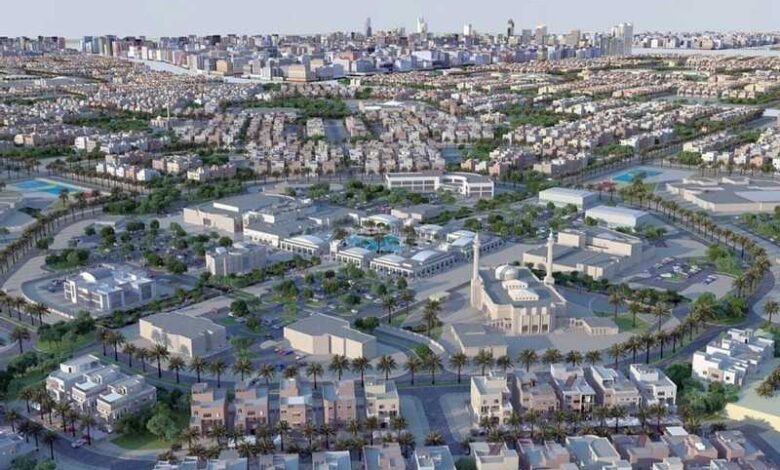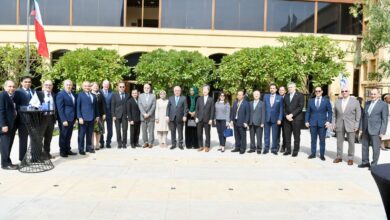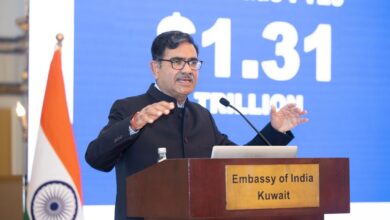Public Authority sparks private sector growth in cities, industrial zones
The authority aims to regulate, promote, and encourage industrial investment and development through programs for private sector development of cities or industrial zones.

-
The law allows the Public Authority for Industry to establish industrial projects that are important to the national economy and to participate in their establishment with capital or an in-kind share.
-
The authority aims to increase the industrial sector’s contribution to national income, enhance interconnection, and integrate economic activities among GCC countries.
The Public Authority for Industry, in cooperation with the British consulting company Maxwell Stamp and the Gulf Organization for Industrial Consulting, has completed a project to amend the Industry Law. This initiative aims to finalize the draft National Industrial Strategy for the State of Kuwait 2035.
The authority aims to regulate the industrial sector, promote industrial development, and encourage industrial investment by implementing encouraging programs for the private sector to establish and develop cities or industrial zones.
The law also allows the authority to establish industrial projects that are important to the national economy and to participate in their establishment with capital or an in-kind share.
Furthermore, the law emphasizes the importance of the Industry Authority in encouraging the financing of industrial projects. In light of this, it provides means to facilitate industrialists’ financing of their projects with financial institutions. This includes allowing the mortgage of usufruct rights and facilities built on the industrial project, along with setting controls for this in coordination with the Industrial Bank of Kuwait.
The authority’s objectives include:
- Implementing the requirements of economic development plans and programs in the country, and contributing to the implementation of Gulf Cooperation Council (GCC) countries’ policies towards industrialization.
- Developing local industries and encouraging them to utilize all available means for their development and sustainability, while taking necessary measures to protect national industrial production in coordination with GCC countries.
- Increasing the industrial sector’s contribution to national income, expanding industrial interconnection, and integrating economic activities among GCC countries.
- Encouraging productivity development and enhancing national industrial competitiveness regionally and internationally.
- Diversifying the industrial and craft base, enhancing the export capabilities of the industrial sector at both quantitative and qualitative levels, and focusing efforts on sectors with export potential.
- Diversifying sources of national income by increasing the industrial sector’s contribution to the gross domestic product.
- Considering the country’s economic needs, the potential for local consumption and export, and the availability and utilization of inputs suitable for manufacturing in GCC countries.
- Strengthening policies for a qualified national workforce in the industrial sector, including the recruitment and training of national workers, and creating an appropriate climate to attract more technically skilled national workforce.
- Encouraging and developing small and medium industrial projects and industrial crafts, and collaborating with competent national authorities to provide appropriate support for these projects.
- Encouraging and developing the production of strategic goods to enhance food and health security in the country. This includes supporting and promoting research, development, innovation, and investment in food industries, pharmaceutical industries, and healthcare.
- Supporting cooperation, integration, and coordination among GCC countries in matters related to industry, expanding industrial interconnection, and integrating economic activities between the GCC countries.
- Promoting competition and combating harmful trade practices within the framework of efforts by competent national authorities and relevant bodies in the Gulf Cooperation Council.
- Encouraging oil-related industries to maximize the multifaceted benefits from the primary source of state income.
- Promoting innovation, importing and adopting advanced technology, and localizing it within the country to drive advancements in the industrial sector and boost its competitiveness.
- Promoting knowledge-based industries and facilitating the digital transformation of industrial projects by encouraging modernization and development of manufacturing technologies to align with the Fourth Industrial Revolution and utilize advanced technologies.
- Fostering environmental industries and promoting industrial projects focused on environmental protection methods, including the use of energy-efficient machinery and equipment in manufacturing processes.
- Increase investments in research, development, and innovation.
- Developing cities and industrial areas.
- Enhancing commitment to security, health, safety, and environmental protection standards.
- Strengthening the commitment to public order, customs, and traditions in Kuwait and other GCC countries.
Authority’s powers
The authority undertakes the following tasks:
- Developing an industrial strategic plan aligned with the country’s national development plan that includes a clear definition of industrial development strategies aimed at achieving competitive, innovative, and sustainable industries.
- Conducting periodic industrial surveys to identify projects that can be established in the country based on the needs of the local market, opportunities available in the common Gulf market, and export opportunities.
- Implementing the strategy for developing industrial areas or cities, planning, supervising them, and establishing rules and procedures related to their establishment, development, operation, management, and maintenance.
- Planning and equipping the infrastructure of industrial and craft areas or cities, including necessary industrial services and public facilities within the competencies defined by this law and its regulations, in cooperation with relevant authorities.
- Preparing, designing, and implementing industrial service projects that complement the industry, and directly operating and managing them or cooperating with the private sector.
- Establishing, managing, operating, and maintaining specific industrial cities or zones in the areas designated for development in case developers and operators do not submit offers to invest in the process of establishing, developing, operating, managing, and maintaining those areas. This approach aims to achieve a policy of distributing industrial development comprehensively and evenly.
- Managing, operating, developing, and maintaining industrial and craft areas and cities, while providing necessary services and ensuring their upkeep and establishing new industrial areas in collaboration with the private sector.
- Granting licenses based on which developers or operators are qualified to conduct development or operational work in cities or industrial zones specified according to this law and its regulations.
- Coordinating with the competent authorities regarding the issuance of licenses to build facilities in industrial and craft areas.
- Developing building requirement guides that include building standards and requirements for cities or industrial areas in coordination with the competent authorities.
- Coordination with competent authorities regarding maintaining cleanliness of public roads, squares, and sidewalks from waste generated by factories and public stores in areas under the authority’s supervision.
- Developing classification and numbering guides for commodity inventory, as well as preparing regulations for standard specifications for products.
- Monitoring the performance of developers and operators to ensure their compliance with the terms of the development and operation contract, or with one of them, and ensuring the implementation of all provisions and instructions.
- Allocating industrial plots and service sites within the industrial area or city according to approved systems and regulations.
- Concluding contracts, collecting fees for using industrial plots and service sites, and collecting fees and charges for services provided by the authority.
- Determining the fee for usage, fees, and charges for services will be done through a decision of the Council of Ministers, based on the proposal of the Minister of Commerce and Industry.
- Carrying out procedures for monitoring establishments in industrial zones, conducting industrial inspections, ensuring industrial safety, and environmental monitoring in coordination with competent authorities, within the scope of competencies defined by this law or any other relevant law.
Exemption from customs duties
Imports of all industrial projects established in Kuwait, necessary as inputs for industrial production, are exempt from customs duties.
This exemption is in accordance with the controls for exempting industry inputs from taxes (customs duties agreed upon within the framework of the Cooperation Council). Priority in obtaining the benefits referred to in the previous article shall be given to the following industrial projects:
- Industries based on the exploitation and development of natural resources available in the State of Kuwait and other GCC countries.
- Projects established in areas designated by the state for their development purposes.
- Projects of special economic importance or those included in the state’s industrial development plans.
- Projects that support drug sufficiency and food security to meet the country’s needs and reduce imports.
- Industries contributing to achieving Gulf industrial integration through joint investment in industrial projects.
- Projects relying on environmental protection technologies.
- Projects based on the use of technology and working to develop and localize it.
- Industrial projects based on knowledge, intellectual assets, and innovation, especially those with patents, other industrial property rights, and copyrights.












